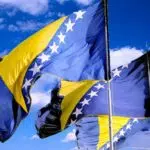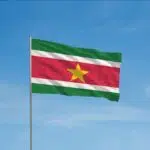National Day of Bosnia and Herzegovina is observed on November 25 of every calendar year. The day is also known as Statehood Day of Bosnia and Herzegovina and it commemorates the anniversary of the day on which Bosnia and Herzegovina was re-established by the Anti-Fascist Council of National Liberation of Yugoslavia in 1943. The Resolution of the State Anti-fascist Council for the National Liberation of Bosnia and Herzegovina (Z.A.V.N.O.B.i.H.) declared both Bosnia and Herzegovina’s will for the Federal People’s Republic of Yugoslavia to be their country. Not belonging to the Serbs, Muslims, or Croats, but one of equal rights for all its citizens instead.
History of National Day of Bosnia & Herzigovina
During World War II, the Kingdom of Yugoslavia was occupied by the Axis powers, and control was split between Germany, Italy, Hungary, and Bulgaria. The Partisan resistance to the occupiers was led by the Communist Party of Yugoslavia, which gathered support across all parts of the country. In November 1942, Josip Broz Tito assembled the Anti-Fascist Council of National Liberation of Yugoslavia (A.V.N.O.J.).
Between November 25 and 26, 1943, the first session of the State Anti-fascist Council for the National Liberation of Bosnia and Herzegovina took place in Mrkonjić Grad, where they elected their representatives to partake in the second A.V.N.O.J. in the town of Jajce, Bosnia. They met on November 29 to decide what to do with Yugoslavia after the war. The Resolution of The State Anti-fascist Council for the National Liberation of Bosnia and Herzegovina (Z.A.V.N.O.B.i.H.) declared the right to self-determination of the people, including Serbs, Croats, Slovenes, Montenegrins, and Macedonians, would become the basis of federal Yugoslavia, and they would live in six constituent republics with equal rights. Bosnia and Herzegovina was thus reestablished as a republic within the Yugoslavian federation within its Habsburg borders, and equal communities of Muslims (Bosniaks), Serbs, and Croats.
The end of the war resulted in the establishment of the Federal People’s Republic of Yugoslavia, with the constitution of 1946 officially making Bosnia and Herzegovina one of six constituent republics in the new state. The Law on the Proclamation of November 25 as the Statehood Day of Bosnia and Herzegovina, on the Official Gazette of the Republic of Bosnia and Herzegovina, No. 9/95, stipulates that that date is the Statehood Day of Bosnia and Herzegovina and that it’s a national holiday that prohibits state bodies, legal entities, and enterprises from working on the day.
National Day of Bosnia & Herzigovina timeline
Josip Broz Tito, part of the Communist Party of Yugoslavia, assembles the Anti-Fascist Council of National Liberation of Yugoslavia during the World War II occupation of the country by the Axis powers.
In the first session of the State Anti-fascist Council for the National Liberation of Bosnia and Herzegovina, they elect their representatives to partake in the second A.V.N.O.J.
The Resolution of Z.A.V.N.O.B.i.H. declares that Bosnia And Herzegovina will be re-established as a republic within the Yugoslavian federation with equal communities of Muslims, Serbs, and Croats.
The constitution officially makes Bosnia and Herzegovina one of six constituent republics in this new state.
National Day of Bosnia & Herzigovina FAQs
When did Bosnia get freedom?
Citizens of the Socialist Republic of Bosnia and Herzegovina voted in an independence referendum held between February 29 and March 1, 1992. The results of the referendum were accepted on March 6 by the Parliament of Bosnia and Herzegovina, and on April 7, the European Community recognized the country as an independent state.
Who did Bosnia gain independence from?
They became independent from the former Yugoslavia.
Why does Bosnia have two names?
After the Austro-Hungarian occupation in 1878, the region of Bosnia was reorganized jointly with the neighboring region of Herzegovina, thus creating the dual name of Bosnia and Herzegovina.
How to Observe National Day of Bosnia & Herzigovina
Rest at home
Since it’s a national holiday, people in Bosnia and Herzegovina don’t work on this day. If you live here, it’s a good day to take a well-deserved break. Sleep some more, read a book, or do anything you like!
Visit the Eternal Flame in Sarajevo
The Eternal Flame is a memorial to the military and civilian victims of the Second World War. It was established on April 6, 1946, the first anniversary of the liberation of Sarajevo from the four-year-long occupation by Nazi Germany and the fascist Independent State of Croatia.
Discuss National Day of Bosnia and Herzegovina with others
Ask your friends and family about this day. What do they know about its history? What does it mean today to people from Bosnia and Herzegovina? You can also discuss the holiday on social media, remember to use the hashtag #NationalDayOfBosniaAndHerzegovina or #StatehoodDayOfBosniaAndHerzegovina.
5 Facts About Bosnia And Herzegovina That You Should Know
It’s called “the Heart-Shaped Land”
This is because the country has a shape that slightly resembles a heart.
They adore coffee
Bosnia And Herzegovina have the 10th highest coffee consumption per capita in the world.
It has Europe’s last remaining jungle
The Perućica Forest Reserve has an area of 3,500 acres, which isn’t much, but many trees are over 300 years old, and the primeval forest's vintage is stated to be 20,000 years.
Landmines
It has one of the worst landmine problems in the world, as there are still around 200,000 mines to be cleared due to the war.
The Sarajevo Sahat Tower
It’s said that this historic timepiece is the only clock in the world that keeps track of lunar time.
Why National Day of Bosnia & Herzigovina is Important
It marks the beginning of the Socialist Republic of Bosnia and Herzegovina
The predecessor of modern-day Bosnia and Herzegovina, it had a complicated history and went through several name changes. The historical importance of this day cannot be understated.
It reminds us of the importance of fighting against fascism
The Anti-Fascist Council of National Liberation of Yugoslavia and the State Anti-fascist Council for the National Liberation of Bosnia and Herzegovina are very important to this day’s history. We must ensure that the people across the world are free whenever we can.
It’s a good day to learn more about Bosnia and Herzegovina
If you’re not from this country, this may be your first time learning about this day. If anything in this article got you interested, use this day to learn more about their history, culture, geography, etc.
National Day of Bosnia & Herzigovina dates
| Year | Date | Day |
|---|---|---|
| 2025 | November 25 | Tuesday |
| 2026 | November 25 | Wednesday |
| 2027 | November 25 | Thursday |
| 2028 | November 25 | Saturday |
| 2029 | November 25 | Sunday |








